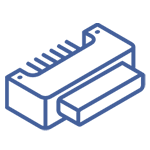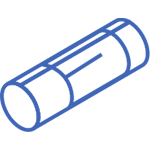

Phoenix Contact 1991231
Manufacturer No:
1991231
Tiny WHSLManufacturer:
Utmel No:
1894-1991231
Package:
-
Description:
1991231 datasheet pdf and Terminal Blocks - Wire to Board product details from Phoenix Contact stock available at Utmel
Quantity:
Unit Price: $9.449052
Ext Price: $9.45
Delivery:





Payment:











In Stock : 28
Minimum: 1 Multiples: 1
Qty
Unit Price
Ext Price
1
$9.449052
$9.45
10
$8.914200
$89.14
100
$8.409623
$840.96
500
$7.933606
$3,966.80
1000
$7.484534
$7,484.53
Want a lower wholesale price? Please send RFQ, we will respond immediately.
RFQ Now
Add to RFQ list
You may place an order without registering to Utmel.
We strongly suggest you sign in before purchasing as you can track your order in real time.
For your convenience, we accept multiple payment methods in USD, including PayPal, Credit Card, and wire transfer.
RFQ (Request for Quotations)It is recommended to request for quotations to get the latest prices and inventories about the part.
Our sales will reply to your request by email within 24 hours.
1. You'll receive an order information email in your inbox. (Please remember to check the spam folder if you didn't hear from us).
2. Since inventories and prices may fluctuate to some extent, the sales manager is going to reconfirm the order and let you know if there are any updates.
- TypeParameter
- Mounting Type
The "Mounting Type" in electronic components refers to the method used to attach or connect a component to a circuit board or other substrate, such as through-hole, surface-mount, or panel mount.
Through Hole - Mount
In electronic components, the term "Mount" typically refers to the method or process of physically attaching or fixing a component onto a circuit board or other electronic device. This can involve soldering, adhesive bonding, or other techniques to secure the component in place. The mounting process is crucial for ensuring proper electrical connections and mechanical stability within the electronic system. Different components may have specific mounting requirements based on their size, shape, and function, and manufacturers provide guidelines for proper mounting procedures to ensure optimal performance and reliability of the electronic device.
Through Hole - Housing Material
The parameter "Housing Material" in electronic components refers to the material used to encase or protect the internal circuitry of the component. The housing material plays a crucial role in providing physical protection, insulation, and environmental resistance to the electronic component. Common housing materials include plastics, metals, ceramics, and composites, each offering different levels of durability, heat resistance, and electrical properties. The choice of housing material is important in determining the overall performance, reliability, and longevity of the electronic component in various operating conditions.
Polyamide (PA), Nylon - Contact Material - Plating
Contact Material - Plating refers to the material used to coat the contact surfaces of electronic components, such as connectors or switches, to enhance their performance and durability. Plating is applied to prevent corrosion, improve conductivity, and reduce friction between contacts. Common plating materials include gold, silver, nickel, and tin. The choice of plating material depends on factors such as the application requirements, cost considerations, and environmental conditions in which the component will be used. Overall, the plating material plays a crucial role in ensuring reliable electrical connections and long-term functionality of electronic components.
Copper Alloy - Tin Plated - Clamp Material - Plating
Clamp Material - Plating refers to a surface treatment applied to the clamp components of electronic devices that enhances durability, conductivity, and corrosion resistance. This plating can involve various metals such as gold, nickel, or tin, which improve the electrical connection and provide protection against environmental factors. The choice of plating material is crucial for ensuring optimal performance and longevity in electronic applications.
- - Screw Material - Plating
The parameter "Screw Material - Plating" in electronic components refers to the material used for the screw along with any plating or coating applied to it. The screw material is the base material from which the screw is made, such as stainless steel, brass, or aluminum. The plating refers to a thin layer of metal or other material applied to the surface of the screw for various purposes, such as corrosion resistance, improved conductivity, or aesthetic appeal. The choice of screw material and plating can impact the performance, durability, and appearance of the electronic component in which it is used.
- - RoHSDetails
- Voltage, Rating160 V
- Contact MaterialsCopper
- Factory Pack QuantityFactory Pack Quantity50
- Unit Weight0.316937 oz
- PackageBulk
- MfrPhoenix Contact
- Torque-Screw-
- Product StatusActive
- Termination MethodSpring Cage
- Rohs CodeYes
- Manufacturer Part Number1991231
- Part Life Cycle CodeActive
- Ihs ManufacturerPHOENIX CONTACT GMBH & CO KG
- Risk Rank5.7
- Operating Temperature
The operating temperature is the range of ambient temperature within which a power supply, or any other electrical equipment, operate in. This ranges from a minimum operating temperature, to a peak or maximum operating temperature, outside which, the power supply may fail.
-40°C ~ 100°C - Series
In electronic components, the "Series" refers to a group of products that share similar characteristics, designs, or functionalities, often produced by the same manufacturer. These components within a series typically have common specifications but may vary in terms of voltage, power, or packaging to meet different application needs. The series name helps identify and differentiate between various product lines within a manufacturer's catalog.
COMBICON FFKDSA - TypePCB Terminal Block
- Number of Positions11 Position
- ColorGreen
- Gender
In the context of electronic components, the parameter "Gender" typically refers to the physical characteristics of connectors or interfaces that determine how they can be mated together. Connectors are often designed with specific gender types, such as male or female, to ensure proper alignment and connection between devices. A male connector typically has protruding pins or plugs that fit into a corresponding female connector, which has receptacles or sockets to receive the pins. This design helps prevent incorrect connections and ensures a secure and reliable electrical connection. Understanding the gender of connectors is crucial when designing or assembling electronic systems to ensure compatibility and proper functionality. It is essential to match the gender of connectors correctly to avoid damage and ensure optimal performance of the electronic components.
Female - Pitch
In electronic components, "Pitch" refers to the distance between the center of one pin or lead to the center of the adjacent pin or lead on a component, such as an integrated circuit (IC) or a connector. It is a crucial parameter as it determines the spacing and alignment of the pins or leads on a component, which in turn affects how the component can be mounted on a circuit board or connected to other components.The pitch measurement is typically expressed in millimeters (mm) or inches (in) and plays a significant role in determining the overall size and layout of a circuit board. Components with different pitches may require specific types of circuit boards or connectors to ensure proper alignment and connection. Designers must carefully consider the pitch of components when designing circuit layouts to ensure compatibility and proper functionality of the electronic system.
3.81 mm - Reach Compliance Code
Reach Compliance Code refers to a designation indicating that electronic components meet the requirements set by the Registration, Evaluation, Authorization, and Restriction of Chemicals (REACH) regulation in the European Union. It signifies that the manufacturer has assessed and managed the chemical substances within the components to ensure safety and environmental protection. This code is vital for compliance with regulations aimed at minimizing risks associated with hazardous substances in electronic products.
compliant - Current Rating
Current rating is the maximum current that a fuse will carry for an indefinite period without too much deterioration of the fuse element.
12 A - Number of Contacts11
- Housing Color
Housing color in electronic components refers to the color of the protective casing or enclosure that surrounds the component. It can play a role in visual identification, aiding in easy recognition during assembly or maintenance. Additionally, the housing color may also have implications for heat dissipation, aesthetic considerations, or regulatory compliance depending on the application or industry standards.
Green - Wire Gauge
a measurement of?wire?diameter.?This determines the amount of electric current the wire can safely carry, as well as its electrical resistance and weight.
16-26 AWG - Voltage
Voltage is a measure of the electric potential difference between two points in an electrical circuit. It is typically represented by the symbol "V" and is measured in volts. Voltage is a crucial parameter in electronic components as it determines the flow of electric current through a circuit. It is responsible for driving the movement of electrons from one point to another, providing the energy needed for electronic devices to function properly. In summary, voltage is a fundamental concept in electronics that plays a key role in the operation and performance of electronic components.
300 V - Number of Levels1
- Current
In electronic components, "Current" refers to the flow of electric charge through a conductor or semiconductor material. It is measured in amperes (A) and represents the rate at which electric charge is moving past a specific point in a circuit. Current is a crucial parameter in electronics as it determines the amount of power being consumed or delivered by a component. Understanding and controlling current is essential for designing and operating electronic circuits efficiently and safely. In summary, current is a fundamental electrical quantity that plays a key role in the functionality and performance of electronic components.
6 A - Terminal and Terminal Block Type
The parameter "Terminal and Terminal Block Type" in electronic components refers to the specification that describes the design and functionality of the connection points where electrical wires are attached. This includes various configurations such as screw terminals, spring terminals, push-in terminals, and barrier terminals. The type of terminal affects the ease of installation, reliability, and suitability for specific applications or environments. Additionally, the parameters often indicate the number of poles or connections that a terminal block can accommodate, which is crucial for organizing and managing electrical connections in circuits.
BARRIER STRIP TERMINAL BLOCK - Positions Per Level
The parameter "Positions Per Level" in electronic components refers to the number of distinct positions or locations available on a single level of a component, such as a connector or a circuit board. This measurement is crucial for determining the capacity and layout of electronic systems, as it influences how connections are made and how components are arranged. A higher number of positions typically allows for more complex interconnections and greater functionality within a given space.
11 - Mating Orientation
Mating orientation in electronic components refers to the specific alignment or positioning required for two components to connect or fit together properly. This parameter is crucial for ensuring that the components can be securely joined and function as intended within a larger electronic system. It may involve considerations such as the physical shape, size, and alignment of connectors, pins, or other mating features on the components. Proper mating orientation is essential for establishing electrical connections, transmitting signals, and enabling the components to work together seamlessly. Manufacturers often provide detailed specifications and guidelines for mating orientation to help users correctly assemble and integrate electronic components.
Vertical with Board - Wire Termination
a piece of electrical equipment that's attached to either end of an electrical wire.
Screwless - Leg Spring, Push-In Spring - Screw Thread
In electronic components, the parameter "Screw Thread" refers to the type of threading used on a component that allows it to be securely attached to a mating part using a screw or bolt. The screw thread parameter typically includes information such as the thread pitch, diameter, and type of thread (e.g., metric or imperial). This information is crucial for ensuring compatibility and proper assembly of electronic components within a system. Different components may have different screw thread specifications based on their intended use and design requirements. Understanding and correctly specifying the screw thread parameter is essential for successful installation and maintenance of electronic components.
- - Connection Method
the systematic way of connecting the Power Plant (units) to the power grid.
Push-In - Product
In the context of electronic components, the parameter "Product" typically refers to the specific item or device being discussed or analyzed. It can refer to a physical electronic component such as a resistor, capacitor, transistor, or integrated circuit. The product parameter may also encompass more complex electronic devices like sensors, displays, microcontrollers, or communication modules.Understanding the product parameter is crucial in electronics as it helps identify the characteristics, specifications, and functionality of the component or device in question. This information is essential for selecting the right components for a circuit design, troubleshooting issues, or comparing different products for a particular application. Manufacturers often provide detailed product datasheets that outline key specifications, performance characteristics, and application guidelines to assist engineers and designers in utilizing the component effectively.
Fixed Terminal Blocks - Features
In the context of electronic components, the term "Features" typically refers to the specific characteristics or functionalities that a particular component offers. These features can vary depending on the type of component and its intended use. For example, a microcontroller may have features such as built-in memory, analog-to-digital converters, and communication interfaces like UART or SPI.When evaluating electronic components, understanding their features is crucial in determining whether they meet the requirements of a particular project or application. Engineers and designers often look at features such as operating voltage, speed, power consumption, and communication protocols to ensure compatibility and optimal performance.In summary, the "Features" parameter in electronic components describes the unique attributes and capabilities that differentiate one component from another, helping users make informed decisions when selecting components for their electronic designs.
Lever Actuated - Height17.1 mm
- Length12.7 mm





























